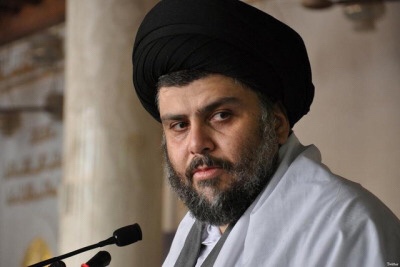
Moqtada al-Sadr’s Turnaround with Iran
Al Arabiya
Muqtada al-Sadr disappointed many who had initially believed that the victory of his electoral list in the recent Iraqi elections was a defeat for Tehran, especially after Sadr stated on several occasions that he wished to be distant from it and to take Iraq away from where Iran wants it to be.
The disappointment, of course, comes with the announcement of an alliance between the Sairoon list of Muqtada al-Sadr with Al-Fatah list which is led by Tehran’s number one man in Iraq Hadi al-Amiri. Amiri’s list came in second among Shiite victors in the elections.
There is a striking Arab absence from every aspect of life in Iraq. There is no trace of an Arab presence in Baghdad, except for the embassies inhabited by wary diplomats who pass most of their time within the confines of their missions. This reality makes any attempt to distance oneself from Tehran like a journey into the unknown
Hazem al-Amin
Iran’s continuing sway
In fact, the notion that Tehran has suffered a setback during the Iraqi elections is a mistake for various reasons. For the sake of the argument, even if we believe that Sadr's victory marks a relapse for Tehran, it is to be noted that the total number of seats won and that are closely linked to Iran will lead to the conclusion that Tehran has the largest influence in the new Iraqi parliament.
In addition, those who rushed to welcome Sadr’s victory out of belief that he is a foe of Tehran are naïve and unaware of the nature of the relations between the Shiites of Iraq and the sectarian depth (Iran) and the national depth (the Arab world).
The Shiites of Iraq feel that they are Arabs. Every day, they find contrast between their Shiism and the Shi'ism of Iran. Many of these dissimilarities are cultural, linguistic and economic and have to do with everyday life. At the same time they feel the advancement of the sectarian depth as opposed to national depth. Even if sourness in relations with Tehran has given them some negative feelings, the bitterness of the relationship with Arab states has produced even more negativity.
Another thing to highlight in this regard is that Tehran is present in every sphere of Iraqi public life. It is present in the corruption, in the militias, in the wars and in the number of its tourists and visitors to Iraq. Iran is present in the formation of party lists, alliances and in relations with Sunnis and Kurds.
In contrast, there is a striking Arab absence from every aspect of life in Iraq. There is no trace of an Arab presence in Baghdad, except for the embassies inhabited by wary diplomats who pass most of their time within the confines of their missions.
This reality makes any attempt to distance oneself from Tehran like a journey into the unknown. Who will embrace those who decide to distance themselves from Tehran? And even if one finds someone, how will this relationship be managed? How can someone who decides to stay away from Tehran receive help of Arabs who are nowhere in the picture?
Sadr’s ties with Qom
Little research has been done to help understand the nature of the relations between Muqtada al-Sadr and Tehran. The man who recently “stepped away” from Iran has lived in Qom for years and studied at the hands of its scholars. He is the son of the Vocal Hawza which was founded by his father and which is the closest Iraqi Fiqh school to the current Wilayat al-Faqih doctrine. In contrast, he was one of the most turbulent Iraqi Shiite politicians and he made statements that were not in accordance with the Iranian position, whether in Iraq or the region.
Sadr has recently announced that he will form an alliance with Hadi al-Amiri, the leader of the Iraqi militias fighting on all sectarian fronts and which have been formed under Qassem Soleimani’s supervision. It is also worth mentioning that Sadr also has his own militias, known as Saraya al-Salam. This alliance cannot be understood within the context that Sadr’s victory in the elections means Tehran’s defeat.
Iran has many cards in its hands, even more so in Iraq. It has been watching the progress of the ‘troublesome’ politician in the elections and did not rush to categorize him as an opponent. Iran is well aware that the sectarian reality is stronger than politicians’ choices and aspirations to stay away from it. Iran is also aware that those who wish to keep distance will not find what they need with ‘others,’ whether Arabs or Turks. We cannot leave aside the great misunderstanding between Sadr and Washington, which is much more than his misunderstanding with Tehran. This fact should be taken into consideration by those who concluded that Sadr’s victory means the defeat of Tehran.
While Sadr and Amiri were meeting in Najaf, Qassem Soleimani was making a pilgrimage to Karbala, watching the details of the meeting and sending his fake smiles through Skype to the negotiating teams.
This article is also available in Arabic.
_____________________________
Hazem al-Amin is a Lebanese writer and journalist at al-Hayat. He was a field reporter for the newspaper, and covered wars in Lebanon, Afghanistan, Iraq and Gaza. He specialized in reporting on Islamists in Yemen, Jordan, Iraq, Kurdistan and Pakistan, and on Muslim affairs in Europe. He has been described by regional media outlets as one of Lebanon's most intelligent observers of Arab and Lebanese politics.
Last Update: Friday, 22 June 2018 KSA 14:25 - GMT 11:25
Disclaimer: Views expressed by writers in this section are their own and do not reflect Al Arabiya English's point-of-view.
No comments:
Post a Comment